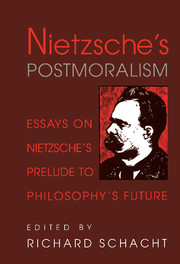Book contents
- Frontmatter
- Contents
- Contributors
- Preface
- A Note on References
- Introduction
- Nietzsche on the Illusions of Everyday Experience
- Masters without Substance
- Rethinking the Subject: Or, How One Becomes-Other Than What One Is
- The Youngest Virtue
- Morality as Psychology, Psychology as Morality: Nietzsche, Eros, and Clumsy Lovers
- On the Rejection of Morality: Bernard Williams's Debt to Nietzsche
- Nietzsche's Virtues: A Personal Inquiry
- Nietzschean Normativity
- Nietzsche's Perfectionism: A Reading of Schopenhauer as Educator
- Bibliography
Rethinking the Subject: Or, How One Becomes-Other Than What One Is
Published online by Cambridge University Press: 20 May 2010
- Frontmatter
- Contents
- Contributors
- Preface
- A Note on References
- Introduction
- Nietzsche on the Illusions of Everyday Experience
- Masters without Substance
- Rethinking the Subject: Or, How One Becomes-Other Than What One Is
- The Youngest Virtue
- Morality as Psychology, Psychology as Morality: Nietzsche, Eros, and Clumsy Lovers
- On the Rejection of Morality: Bernard Williams's Debt to Nietzsche
- Nietzsche's Virtues: A Personal Inquiry
- Nietzschean Normativity
- Nietzsche's Perfectionism: A Reading of Schopenhauer as Educator
- Bibliography
Summary
I teach you the Übermensch. Man is something that shall be overcome. What have you done to overcome him?
Nietzsche, Thus Spoke ZarathustraIn truth, what is the Übermensch? We do not know and, properly speaking, Nietzsche does not know. We know only that the thought of the Übermensch signifies: man disappears; an affirmation that is pushed furthest when it doubles into a question: does man disappear?
Maurice Blanchot, The Infinite ConversationAs Foucault would say, the Übermensch is much less than the disappearance of living men, and much more than a change of concept: it is the advent of a new form that is neither God nor man and which, it is hoped, will not prove worse than its two previous forms.
Gilles Deleuze, FoucaultThe subject has been experiencing something of a comeback, philosophically speaking, in the past decade or so. After being banished by the structuralists in the 1960s to the dustbin of history, one now sees frequent references, even within the most current Continental literature, to the need to recuperate a workable and meaningful notion of the subject. The subject's rise and fall is not unrelated to the position Nietzsche occupies within this Continental literature; and so it is somewhat ironic that the Übermensch, which is generally regarded to be Nietzsche's positive notion of a subject, has fallen on hard times in the recent Nietzsche literature.
- Type
- Chapter
- Information
- Nietzsche's PostmoralismEssays on Nietzsche's Prelude to Philosophy's Future, pp. 47 - 62Publisher: Cambridge University PressPrint publication year: 2000
- 2
- Cited by



